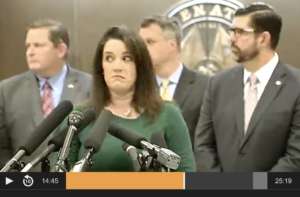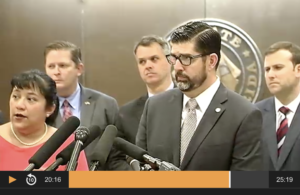The “Fewer, Better Tests” Press Conference: Send in the Clowns
Florida Senator Anitere Flores, Rep. Manny Diaz, Jr and Rep. Chris Sprowls held a press conference on 2/15/17, at the Capitol, to unveil their new “Fewer, Better Tests” Legislation (SB926/HB773). This blog post documents the event (you can watch it here). For this post I am bringing back our old clown logo, because this press conference was an accountabaloney circus.
Surrounded by a “Who’s Who” of conservative Education Reform advocates, including the Florida Chamber, the Foundation for Florida’s Future, Florida TaxWatch, the Hispanic Chamber, James Madison Institute, the Florida Coalitions of School Board Members, the Council for Educational Change, and the Council of 100, Senator Flores said they had heard “loud and clear” from parents, teachers and students about the issue of testing in Florida’s public schools:
“Where is it that somehow, the state of Florida kind of went off the path, when we had this really great idea on the issue of accountability yet somehow that just doesn’t translate… to the classroom… Teachers are frustrated, they feel they have to cram for a test, they have to teach to a test, and that is not and was never the intention of legislators and those who came before us who implemented these reforms. Today we are unveiling some legislation that I think is going to put some commonsense changes into the law so that the tests that we do give across the state of Florida, that they are meaningful, that they’re meaningful for students, that they are meaningful for parents and that they are meaningful for the teachers, as well. This is something that is common sense, it is important.”
Rep. Diaz continued:
“We are here because we care about kids and we care about accountability. Governor Bush said, or has said several times, “If you don’t measure, you don’t care.” So it is important that we continue to measure, but as things happen in the legislature, different legislators come in, different ideas get put into place sometimes the original intent is lost or becomes complicated and in looking at this I know that many people up here … have had conversations with students, with parents, with teachers, with administrators and business leaders in our community, and they have told us loud and clear what is important and that is: we all believe in accountability, we all believe that we have to have quality education and that we have to measure it, but at the end of the day we have to have an honest conversation about what we’re doing.” (emphasis added)
[In order to have a truly honest conversation, we would like to point out what Senator Tom Lee said at a recent Senate Appropriations SubCommittee on PreK-12 Education meeting (watch at 1:33:00), that Jeb Bush’s Foundation for Florida’s Future “has locked this legislature down. You can’t get a bill out of this legislature that isn’t supported by the Foundation for Florida’s Future.” So, if we’re being honest, the complications in the current system should not be blamed on “different legislators with different ideas.” The current situation is a direct result of legislature created and aggressively advanced by Jeb’s Foundation.]
Rep Diaz went on the explain the bill:
- “The main point of the bill” is to move the testing calendar back to the last three weeks of the year in an attempt to minimize the disruption that testing causes in the school day and learning environment. “We heard that loud and clear… and pushing back the calendar and having an honest conversation about this is the time we’re going to learn and teach, and this is the time we’re going to test.”
- Teachers will be provided with test results for their current and incoming students. “If we’re testing, if we’re gathering all this data, what are we doing with it?”
- Give test data to parents in a clear and succinct manner. This law will mandate new score reports, which will include areas of strengths and areas of improvement, longitudinal information, if available, and information comparing the students to all students in the district, state and other states (is possible).
- This bill directs the Commissioner of Education to complete a study to determine whether the SAT and ACT would be viable options for testing the current standards. The results of this study “would allow us to have information on hand for us to make an educated decision on this test and not have a mythical magical conversation about changing a test without knowing if it’s even possible.” (emphasis added)
Per Rep. Diaz, those are “the main parts of the bill.”
[For the record, Rep Diaz neglected to mention this bill’s new requirement that “a school district must provide a student’s performance results on district-required local assessments to a school’s teacher within 1 week and to a student’s parents no later than 30 days after administering such assessments.” Please read “Hidden inside ‘Fewer, Better Tests’ are Cold Showers and other Baloney” where we have documented other glaring omissions.]
Rep. Sprowls explained that these bills were developed after gathering feedback from their communities and surveying 400 teachers. He said over 80% of the teachers surveyed, when speaking about local district exams, said it would be helpful to get those results back quickly, so the results could be used to guide learning. He assured the audience “we get the message”:
“We get the message. We got the message from parents and teachers about how they feel about the testing process, the anxiety that some of their students feel, and really the common sense approach of what they need and what kind of tools they need to make sure their children, their students are getting a year’s worth of learning in a year’s worth of time.”
Senator Flores concluded the prepared remarks, saying “I hope that what everyone is hearing is that these are just common sense things that sometimes as legislators we get frustrated that we have to actually make a law to address these common sense things, but we do and so here we are.”
At this point the press conference was opened to questions:
Will the requirements for improved test score reports have an impact on the overall cost of the FSA? Senator Flores, may be unaware that the current contract for the FSA expires this year, as she said these changes would be for the next procurement and “any people who would say the cost is too high to do the right thing on this issue is not something that I’d be persuaded by”, suggesting she has no idea how this will affect the costs of the next-generation FSA.
The complaints about the issues you are addressing have been around for 10-15 years but until the new FSA was administered there was a “strong arm, get used to it” response. Are these bills in response to the failed FSA? Per Senator Flores “No, I think what changed it is there is finally a sense of political will to say we have to do better…”
[We suspect the increasingly loud voice of parents speaking out against the test and punish system, along with the fact that Jeb Bush is no longer running for president (freeing up other republican lawmakers to tackle the flaws in the current accountability system with fewer concerns for protecting the “Bush legacy”) also may be responsible for the Foundation’s current interest in making minor tweaks to the accountability system, giving the appearance of responding to public outcry regard testing. Also, only in recent years, since the passage of SB736 in 2011, have teacher salaries been tied to student test scores. We believe the passage of SB736 contributed significantly to the amount of stress, test prep and testing in today’s classrooms, leading to the crescendo of complaints about the current test and punish system.]
 The BEST question and answer exchange occurred at 14:27:
The BEST question and answer exchange occurred at 14:27:
- Reporter: So how many tests does this actually eliminate?
- Senator Flores: “It doesn’t eliminate any tests.”
- Reporter: “Well it says “fewer tests so I guess I’m wondering…”
- Senator Flores “it does reduce the testing window, and it, so, I mean, so but I don’t know if it actually eliminates any of them.”
So, if we understand this correctly, the “Fewer, Better Tests” legislation doesn’t actually mandate “fewer tests.” Enter from stage right, Patricia Levesque, CEO of Jeb’s Foundation for Florida’s Future, to help these legislators explain what their sponsored legislation will do: specifically, it will require district assessments to return their results to teachers within one week of administration and, hopefully, those districts won’t be able to comply with that turnaround time and they will decide to drop their district tests. [What was Rep. Diaz saying earlier about having “a mythical magical conversation”?] Ms. Levesque claimed that based on a survey they did a few years ago, school districts add, on average 98 tests on top of what the state requires and “what we hope to see eliminated is all of those local tests, those 98 tests on average, that would be eliminated if they can’t get the results back within a week.”
Ms Levesque’s presence prompted the next question (at 16:12): “How much co-ordination and conversation did you have with Bush’s Foundation? Per Senator Flores, “We’ve been working with the Foundation along with all our partners on this situation because it’s… the right thing to do for our students.”
Is this bill a testament to the idea that Republicans, in the last few years, have gone too far with testing to begin with? (16:45) Senator Flores: “Absolutely not, I think that what has made our accountability system strong… it’s the best accountability system, I would say, in the whole country and that other states look to, to say, hey, we want to be like Florida when it comes to the accountability…” [This is another place where parents, tired of high stakes testing and the impact on their children, might disagree.]
The reporter’s follow up question was interrupted by Ms. Levesque (at 17:37) who stated that by moving the testing window to the end of the school year, she hoped Florida would set a trend:
“I think what is beautiful about this bill and why we are so thrilled to stand with these lawmakers is because Florida is going to once again be one of the leaders in saying, listen, we have a year’s worth of standards that we want teachers to teach, and almost every state in the country requires teachers to teach them in ¾ of the year, right, so Florida wants to be the first, and we typically are, in saying let’s give the teachers the full year to teach. I’m really hoping that these elected officials and the legislation that they will push will actually start a trend in the country as states look at giving teachers more time to teach, and giving them the full year to teach.”
[Frankly, as parents of public school children in Florida, we are tired of Florida trying to be a leader and we certainly don’t advise other states to follow in our accountabaloney footsteps.]
The next series of questions (beginning at 18:49) demonstrated that these legislators can smell the accountabaloney but they aren’t willing to admit to having been involved in making the sausage. Since this is the first time Republican leadership has stepped in to address accountability issues, was there a tipping point? Rep. Diaz responded:
“I think the tipping point is …as you put these accountability measures into place, things develop at the local level, in response to some of these things, so districts adapt because they feel like they need to have more control of their result, and so that produces what Patricia mentioned earlier which was more of the local testing (to use the analogy of the patient: drawing more blood and checking what’s going on instead of providing more time for medication to work) and that’s what’s produced the overwhelming feeling that kids are just being over-tested everywhere… a lot of those tests are local, because districts want to see where their students are, and I don’t blame them, but, unfortunately, we have to clear the path for learning to go on, and I think that is what this is. It is not admitting that accountability is wrong, not going back in any direction from before, it’s really addressing the fact that there are some things that have changed in the system that need to be addressed and we can’t keep doing patchwork on the system of accountability.”
It is clear that Rep. Diaz can smell the accountabaloney. He admits changes need to be made and issues addressed, but he stops short of recognizing that the number of tests administered by the districts is a direct result of the high stakes attached to the state assessments. He, also, fails to mention that, until HB7029 passed in 2015, local district assessments, in the form of “progress monitoring”, was MANDATED by the state. If there is an excessive amount of testing in the districts, it is because, at least initially, the state encouraged it.
The Reporter asks: It’s the districts’ fault? Diaz replies “I’m not saying it’s their fault. What I’m saying is alot of times districts will want to know where their students are and without even realizing what they’re doing, you start to add tests here and when you look at the entire calendar, all of the sudden you have all these tests that have accumulated.” [Which is the same thing as saying “it’s the districts’ fault.”]
Before anyone else can smell the accountabaoloney, Ms. Levesque, again (at 20:06), interrupts and redirects the conversation toward the moving of the testing  window to the end of the school year. She says this is the answer to the “Why now?” question, stating that technology has advanced to the point that computers can now “test and measure at a much deeper level in a quicker amount of time” allowing computer assessment “without sacrificing that deeper instruction.”
window to the end of the school year. She says this is the answer to the “Why now?” question, stating that technology has advanced to the point that computers can now “test and measure at a much deeper level in a quicker amount of time” allowing computer assessment “without sacrificing that deeper instruction.”
The next question asked if once testing was moved to the end of the school year, would the legislature rethink for legislation mandating the start of the school year? In order to allow more instructional time prior to state testing, districts began altering their calendars, starting the school year earlier and earlier in August. Legislation was passed to restrict that practice. Senator Flores said she would be in favor of a later start date and explained that the only reason the legislature had to set “no sooner than” start dates was because “Local Control had sometimes gotten out-of-control,” in other words, it was another consequence of accountabaloney. [The question of the effect of the delayed testing window on the school calendar is an excellent one. Will moving the testing window to the “last three weeks” of the school year require that all districts comply with the same school year calendar or will districts retain local control of their school start and end dates? Will all districts be required to test during the same three calendar weeks?]
Rep. Diaz emphasized (at 24:00) that, in the beginning, available technology did not exist that would allow state tests, completed on pencil and paper, to be scored and converted into school grades quickly. New technology allows a quicker turn around of results, allowing the calculation and reporting of school grades in a short enough period of time to move the testing window. “A testing vendor 5,6,7 years ago wouldn’t be able to tell you with certainty they would be able to turn those scores around in the time frame that they can probably do it now.” (emphasis added).
[When Rep. Diaz says testing vendors can “probably do it now” is he engaging in another one of those “a mythical magical conversations”? Current state assessments require an essay portion for grades 4-10. What is the turnaround time for grading writing assessments? Will this result in computer grading of student essays or the elimination of the writing portion all together? Have they addressed these issues with the FSA vendor?]
At this point the circus, I mean press conference, concluded.
This “Fewer, Better Tests” legislation does NOT eliminate any state mandated tests, nor does it make an test better. Ignoring the idea that districts might become compelled to decrease or change their local assessments (which is probably more of that mythical magical thinking), the state assessments remain exactly the same. What do these bills do? They move the state testing window to the end of the school year and shortens it to three weeks. They require teachers be provided with test results for their current and incoming students (something that already happens at my children’s schools) and mandate that districts provide local test results in a more timely fashion. They ask the Commissioner of Education to evaluate whether the SAT or ACT could be used to replace a few high school level state tests (Both the SAT and the ACT are currently used for concordant scores to satisfy the high school graduation requirement for students who fail the 10th grade FSA English Language Assessment, so we wonder why this hasn’t already been done?)
In a year when parents are clamoring for a reduction in testing and, even these legislators claim to hear them “loud and clear”, we wonder what the real purpose of this legislation is… On the Senate Appropriations Subcommittee on PreK-12 Education, Senators Simmons, Lee and Montford have all implied they are working on legislation to reduce testing. We look forward to reading those bills. Is this “Fewer, Better Tests” legislation designed to complement those bills or is it a clear indication of what additional changes the Foundation for Florida’s Future is willing to tolerate?
To be clear: SB926/HB773, the “Fewer, Better Tests” bills WILL NOT result in fewer state tests. They WILL NOT change to any better state tests. Despite Ms. Levesque’s magical thinking, there is no evidence that they will impact the amount of district level testing, because the high stakes attached to the state assessments remain in place.
If these legislators had heard constituents “loud and clear” they would have heard superintendents and parents asking for a return of paper and pencil testing, which, by itself, would have narrowed the assessment window and the disruption the testing calendar creates. They would have heard calls for an end to the state mandated EOCs, returned end of year assessments to the classroom teachers. They would have heard class to return teacher evaluations to the districts and eliminate VAM. They would have heard the superintendents asking that promotion, retention and graduation decisions be returned to the districts.
If they had read Accountabaloney, they would have understood the primary problem with high stakes, standardized testing is the “high stakes”. Changing the tests (if that ever happens), or cramming it into a smaller window without addressing the stakes, will change nothing.
Rather than listening to parents, these legislators appear primarily to have heard the voice of the same foundations that, as Senator Lee pointed out earlier, caused the mess in the first place. These “Fewer, Better Tests” bills are not a solution to the current state of accountabaloney.
